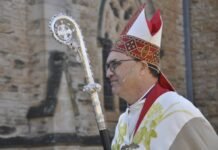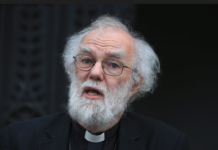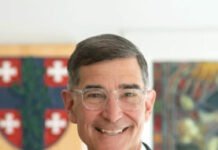In the days after Kanishka Raffel’s election as Sydney’s new Archbishop, his face has been on the major TV news, he has been questioned by the Sydney Morning Herald and now an in-depth interview with ABC Radio.
While Channel Nine News drew comparisons with the first leader of Anglicans in Sydney, Bishop Broughton, the main news on Channel Seven featured the Dean of Sydney speaking about his election last Thursday.

More in depth coverage was provided by the Sun Herald on Sunday and on Monday, when ABC Radio Host Richard Glover asked the Archbishop-Elect about his journey to faith in Jesus.
The ABC has now posted an audio version here (Move the play bar to 2.41 for the start of the interview), or read on for the full transcript of that interview with Richard Glover.
Transcript:
You’re with Richard Glover on ABC Radio, Sydney. Sydney will soon have a new Anglican Archbishop and for the first time it’s a person of colour, Kanishka Raffel. Currently Dean of Saint Andrew’s Cathedral, he was born in England to Sri Lankan parents, coming to Australia at age 7. He’s also a former Buddhist and right now he joins us on drive.
Kanishka, welcome, thanks for talking to me, and most of all congratulations.
KR: Thank you and nice to be on the show.
RG: Now can you first of all, tell us about your childhood? Because really it was, it was a pretty tough start, especially when you arrived in Australia.
KR: Sure. Well, I came to Australia with my family, a mother and father, two sisters in 1972. I was about seven years old and within six months or so of us arriving, my father tragically had a heart attack and died. He was about 42 at the time and so my mother found herself in a new country with no sort of family or anything like that and widowed at 40… with three children.
RG: That must have been an incredible thing for her to somehow battle through.
KR: Yes, of course. When you’re 7 years old, you don’t realize it. I do remember hearing her, you know, cry herself to sleep at night and wondering what she was crying about. But of course, yes, it was a great tragedy.
RG: How how did she cope with it? How did she manage to bring up three kids in a new land?
KR: She has passed away now, but she was a very resilient woman. She was very independently minded and, you know, a tremendous woman. I admire her tremendously.
RG: How did you manage to get to Sydney Uni and study arts law from such a difficult place?
KR: Oh well, Australia is an egalitarian society, a country full of opportunity and I was a good migrant kid. I worked hard and studied and …I got into University, sure.
RG: Something happened to you at University though, didn’t it? I don’t know quite how it happened, but someone flung you a copy of the Gospel of John.
KR: (Laughs) Well, it wasn’t, it wasn’t quite as abrupt as that, actually. He was a good friend. Someone I’d known from high school. My background, of course, is Sri Lankan, and so we were raised Buddhist in Australia, which was a, uh, an unusual kind of experience. I guess you know Sydney in the 70s was a little quieter and, uh, a lot less multicultural! So I was a bit of a novelty wherever I went, but in my third year at University I really decided that I needed to do a kind of adult engagement with my faith of Buddhism. And so, I spent the year really reading Buddhism, and I think maybe bolstered by my new confidence I began to engage my Christian friends about their faith and that resulted in one of those friends giving me the Gospel of John which I undertook to read.
RG: What happened when you read it?
KR: Well, my life changed, Richard. That’s what happened, in short. Having spent the year reading Buddhist scriptures, I was very struck by how different the Gospel of John was. It was transparently historical, clearly talking about a particular man, in a particular place at a particular time and the person of Jesus just emerged from the pages with vitality and vibrancy, and he was unusual. He wasn’t like the Buddha. He had friends and enemies. He got into verbal skirmishes and worse, in the end, and so I found his character intriguing and provocative and compelling. And ultimately, of course I decided I was for him.
RG: See some of your predecessors in this in this role required a full Billy Graham Crusade to get them over the line, but you managed it with a glance at the Gospel of John!
KR: Well, I think it would be true to say that the Gospel of John has been bringing people to Jesus Christ for a very long time, (laughs)
RG: Even longer than Billy?
KR: Even longer than Billy, exactly. Long before Billy. Long before.
RG: People say you give a fine sermon Kanishka, what makes a good sermon?
KR: Oh well, first of all, I’ve got a great subject. Jesus Christ and the love of God. God’s rescue plan for people, his welcome and forgiveness. It is the best thing to talk about! So you know the first thing you need is a person who loves their topic. And if you’re a Christian preacher then you’ve got a topic you love and then I think… look the Bible is the ancient text, so you’ve got to do a bit of bridging the gap. You’ve got try to make it fit in the real world. But the Bible is full of God’s wisdom and God’s purpose for the real world, so it’s not as hard as it sounds, and preachers have the opportunities to put their mind to that question. So yeah, I hope there are lots of people in Anglican churches around Sydney hearing, engaging sermons every week because God is speaking to us through the Bible.
RG: You mentioned the real world and here’s an issue for Sydney Anglicans: A lot of people say you’re out of step with a lot of similar churches, especially in the West, in places like like Britain and the United States. We are far more conservative here than Anglicans are elsewhere. They’ll mention, for instance, the fact that your predecessor Glen Davies, was such a strong advocate in the gay marriage debate. In fact, $1,000,000 in funding was given from the Sydney Diocese to that no campaign. You know some people approved but (it) annoyed the hell out of other people. If people think you’re going to change all that, that’s not necessarily the case, is it?
KR: Well, I think Richard, it’s a matter of confidence and I think in Sydney, we’ve got a tremendous confidence that God is good, that in the Bible, he speaks something that is not only true but lifegiving. And some of the trends around changing that are not necessarily, especially in those Western churches that you referred to, that are adopting other kind of patterns of discipleship – they’re not marked really by great vitality and effectiveness. What we find is that if you have a genuine, vital, living experience of the love of God, that is life transforming. And you know, we’re not trying to lay down laws or anything like that. We’re simply inviting people into relationship with God through faith in Jesus, and it’s what he does. I mean, he transformed my life and every Christian will tell you that Jesus is transforming their lives. It may not be as kind of dramatic as going from Buddhist to Archbishop, but every single Christian knows that the love of God is transforming their lives in ways that they would never have expected, and which are often counter-cultural.
RG: It doesn’t give you and the other Sydney Anglicans, conservative Sydney Anglicans, pause for thought that if you sat down with, I don’t know, the Archbishop of Canterbury that you’d have much more conservative views than him?
KR: Well, I don’t know the Archbishop of Canterbury personally, but I would think that we would have many, many things in common. You know, one of the things we do every Sunday is have a declaration of the faith – the Apostles Creed or something like that. I would expect the Archbishop of Canterbury and Sydney Anglicans to be 100% agreed on that. So, there are particular issues where there may be differences but actually, core Christianity is the same not just across the globe but across denominations as well.
RG: Kanishka Raffel is with us: the new top Anglican, the new Anglican Archbishop of Sydney, replacing Glenn Davies, who of course has been a regular guest here on the Drive show Can I just ask you about reconciliation with Indigenous Australians, ’cause people who know you well say that’s an important thing for you?
KR: Thank you, Richard. Thank you very much indeed. You know I came back to Sydney, I’d been away from Sydney in local church ministry and came back in 2016 to take up the role at Saint Andrew’s Cathedral, which is a tremendous privilege. But you can’t help walking down George St looking at Saint Andrews Cathedral and thinking well, that wasn’t always there. So, it’s been tremendous for me, a tremendous privilege, to meet some local indigenous people. The Anglican church in Sydney has a long history of engagement with indigenous people and not all of it is something of which we’re proud, at all. There are some bright lights, including Richard Johnson, the first chaplain, who was particularly concerned for the welfare of indigenous people. But without a question (there is) much that was not in accordance with the Gospel, which we regret and I think one of the things that has really affected me deeply is the generosity, the graciousness, and the forgiveness of Aboriginal Christian people who I have met, whose families have been traumatized by the Stolen Generations, whose communities experience as we know, such disadvantage – only last week two more deaths in custody. Yet, as I’ve met, especially Aboriginal Christian people, I’ve just been so moved and humbled by their graciousness, their forgiveness, their hope in Jesus, and their hope for better relationships with the wider community. If I could assist with that in any way, that’s what I want to do.
RG: Well, good luck with that task and Kanishka, thank you so much for talking to us.
KR: Richard, it’s a pleasure. Thank you for having me.
(Full audio of the interview here – Move the play bar to 2.41 for the start of the interview)




Thank you Russell.